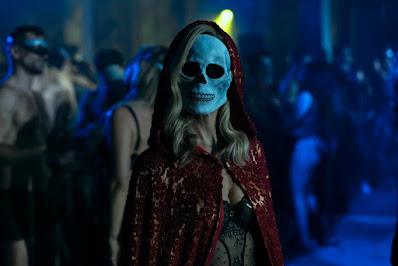Siblings Roderick and Madeline Usher have built a pharmaceutical company into an empire of wealth, privilege and power; however, secrets come to light when the heirs to the Usher dynasty start dying.
Netflix's The Fall of the House of Usher is a television series created by Mike Flanagan and features a cast that includes Bruce Greenwood, Carla Gugino, Mary McDonnell, Carl Lumbly, and Mark Hamill. This adaptation is loosely based on Edgar Allan Poe's short story of the same name. The show unfolds a chilling tale of a pharmaceutical industry magnate, Roderick Usher, who watches his offspring meet gruesome ends during the twilight of his empire. Over the course of its eight episodes, Flanagan crafts a sort of Poe Cinematic Universe, drawing inspiration from Poe's most famous works and weaving them into an original narrative of greed and familial disintegration.
However, The Fall of the House of Usher exhibits a disconcerting discord between its subject matter and its emotional tone. Despite sporadic moments of intrigue, the series lacks the central element found in Poe's works: passion. The characters in Usher may be meeting their fates like characters in a gothic horror tale, but they fail to live with the fervour that such a setting demands.
Mike Flanagan, known for his fondness for jump scares, introspective monologues, and a keen interest in exploring family dynamics, brings these themes to the forefront in this adaptation. Flanagan's perspective suggests that, even in the face of cynicism, there is always hope for family reconciliation or redemption.
The grim deaths of the Usher family members are portrayed as supernatural retribution for their role in America's opioid crisis, which they directly contributed to. While the series references numerous works by Poe, they often serve as mere Easter eggs, failing to enhance the main storyline. Furthermore, the primary narrative suffers from a disconnect between the stories it draws from and the actual direction of the plot.
Even when characters are succumbing to delusions or meeting their demise, the series maintains a detached tonal approach, as if we are observing human suffering from an indifferent corporate tower, much like Roderick Usher himself. While there are elements of horror in The Fall of the House of Usher that are skillfully executed, the series becomes overwhelmed by its inconsistent handling of source material, which might not have been necessary in the first place.
The show's narrative becomes convoluted with flashbacks, subplots, and diversions, to the point where a flow chart would be helpful in navigating it. The overarching story revolves around the impending, bizarre deaths of Usher's reprehensible heirs within a month's time, all connected by a mysterious woman played by Carla Gugino, who serves as an angel of death.
Unlike Flanagan's previous works like The Haunting of Hill House and The Haunting of Bly Manor, The Fall of the House of Usher fails to evoke fear, and this lack of emotional connection permeates the series. The narrative is predominantly retrospective, with the consequences already unveiled, making it challenging to connect with the characters.
The series takes inspiration from various Poe works such as The Fall of the House of Usher, "The Masque of the Red Death," "The Murders in the Rue Morgue," "The Black Cat," "The Tell-Tale Heart," "The Gold Bug," "The Pit and the Pendulum," and the poem "The Raven." These gruesome events are attributed to the karmic revenge of a shape-shifting spectral character named Verna, an anagram of "raven".
Despite the consistency and competence in storytelling, the series' pacing is a significant drawback, particularly in the lengthy flashbacks that reveal the origins of the Usher twins' torment. The revelation may leave the audience somewhat disappointed, as there is still a substantial amount of wrap-up that includes a series of monologues.
Flanagan has transformed stories that fundamentally explore the horror of loneliness into platforms for melodramatic family dynamics. While there are few scares in The Fall of the House of Usher, they often take the form of eerie apparitions suddenly appearing to terrify Roderick Usher.
The initial episode establishes an intriguing narrative, but subsequent episodes follow a formulaic structure. Each episode delves into a different Usher descendant's inner life and the gradual intrusion of a mysterious woman named Verna, leading to their eventual demise. Unfortunately, the characters fail to engage the audience effectively.
The series suffers from predictability and mundanity, which is unexpected, especially given Flanagan's reputation for crafting unconventional narratives. Each episode sets the stage for the downfall of a beneficiary of the ruthless Usher empire, with Roderick recounting the stories of their catastrophic ends. This predictability diminishes the sense of dread.
Although the series contains bursts of gruesomeness, they are insufficient to evoke the melancholic dread typically associated with Poe's works. The series is inundated with an abundance of monologues, all presented in a similar fashion, which becomes tiresome.
In conclusion, The Fall of the House of Usher attempts to amalgamate various elements of Poe's works into a contemporary narrative. While it boasts moments of effective horror and is competent in its execution, the series struggles with tonal inconsistency and a narrative structure that becomes formulaic and repetitive. The emotional depth and connection with the characters are lacking, ultimately leaving the viewer with a sense of detachment. Despite its thematic ambitions, the series fails to fully capture the essence of Edgar Allan Poe's storytelling, resulting in a work that, while intriguing at times, falls short of its potential.
The Fall of the House of Usher was released on Netflix on October 12, 2023






